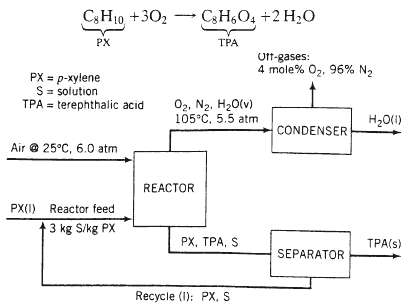Terephthalic acid (TPA), a raw material in the manufacture of polyester fiber, film, and soft drink bottles,
Question:
Terephthalic acid (TPA), a raw material in the manufacture of polyester fiber, film, and soft drink bottles, is synthesized from p-xylene (PX) in the process shown below. A fresh feed of pure liquid PX combines with a recycle stream containing PX and a solution (S) of a catalyst (a cobalt salt) in a solvent (methanol). The combined stream, which contains S and PX in a 3:1 mass ratio, is fed to a reactor in which 90% of the PX is converted to TPA. A stream of air at 25?C and 6.0 atm absolute is also fed to the reactor. The air bubbles through the liquid and the reaction given above takes place under the influence of the catalyst. A liquid stream containing un-reacted PX, dissolved TPA and all the S that entered the reactor goes to a separator in which solid TPA crystals are formed and filtered out of the solution. The filtrate, which contains all the S and PX leaving the reactor, is the recycle stream. A gas stream containing un-reacted oxygen, nitrogen, and the water formed in the reaction leaves the reactor at 105?C and 5.5 atm absolute and goes through a condenser in which essentially all the water is condensed. The uncondensed gas contains 4.0 mole% O2.
(a) Taking 100kmol TPA produced/h as a basis of calculation, draw and label a flowchart for the process.
(b) ?What is the required fresh feed rate (k mol PX/h)?
(c) What are the volumetric flow rates (m3/h) of the air fed to the reactor, the gas leaving the reactor, and the liquid water leaving the condenser? Assume ideal gas behavior for the two gas streams.
(d) What is the mass flow rate (kg/h) of the recycle stream?
(e) Briefly explain in your own words the functions of the oxygen, nitrogen, catalyst, and solvent in the process.
(f) In the actual process, the liquid condensate stream contains both water and PX. Speculate on what might be done with the latter stream to improve the economics of the process.?

Step by Step Answer:

Elementary Principles of Chemical Processes
ISBN: 978-0471720638
3rd Edition
Authors: Richard M. Felder, Ronald W. Rousseau





